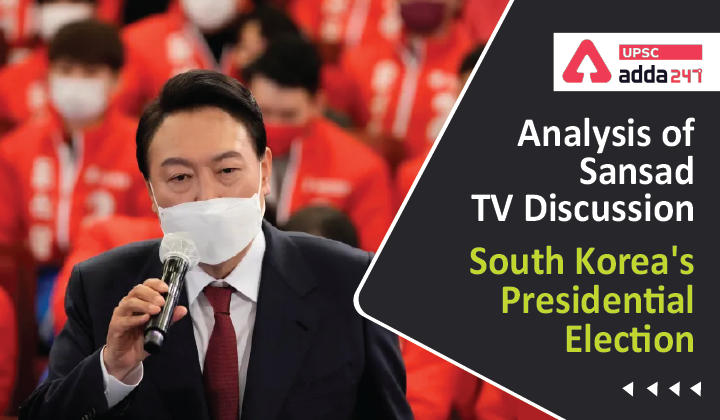Table of Contents
Analysis Of Sansad TV Discussion:
”South Korea’s Presidential Election”
Relevance
”GS 2: Look East to Act East, Effect of Policies & Politics of Countries on India’s Interests”
Context
- Yoon Suk Yeol, a conservative former top prosecutor, has been elected South Korea’s new president, defeating his chief liberal rival in one of the country’s most closely fought presidential elections.
- With more than 98 per cent of the ballots counted, Yoon had 48.6 per cent of the votes against his rival Lee Jae-Myung’s 47.8 per cent.
- Yoon is to take office in May and serve a single five-year term as leader of the world’s 10th-largest economy.
Background
- South Koreans began voting for a new president on March 9, 2022, with a liberal ruling party candidate considered a maverick and a conservative former prosecutor considered the favourites in a tight race that has aggravated the country’s domestic divisions.
- The election was fought between liberal party candidate Lee Jae-Myung and his main conservative challenger, ex-prosecutor general Yoon Suk Yeol.
Mr Lee vs Mr Yoon on North Korea
- Mr Lee, called for exemptions to UN sanctions on North Korea so that dormant inter-Korean economic projects can be revived, and hopes to play a mediator’s role between Pyongyang and Washington over the North Korean nuclear crisis.
- After North Korea’s reported ballistic missile launch Mr Yoon accused North Korean leader Kim Jong Un of trying to influence the results of the South Korean election in favour of Lee.
- Mr Yoon has repeatedly said that he will sternly deal with North Korean provocations and seek to boost trilateral security cooperation with Washington and Tokyo.
Key Challenges before the new President-Elect
- Mr Yoon will have to bring plenty of reforms in a single five-year term.
- South Korea is now grappling with stark income inequalities and soaring personal debt.
- Surge in Covid cases due to Omicron variant.
- South Korea is also facing growing threats from nuclear-armed North Korea.
- Dealing with international relations will not be easy as China-US Rivalry is going day by day.
South Korean Parliamentary System
President
- The executive power is vested in the Executive Branch headed by the President.
- Under the Constitution, the President shall be elected by universal, equal, direct and secret ballot by the people.
- The term of office of the President shall be five years, and the President shall not be reelected.
- Present President Moon Jae-in took office on May 10, 2017.
Legislature
- The National Assembly of the Republic of Korea is the unicameral national legislature of South Korea that represents the people’s opinions.
- All the laws of the country are made by the National Assembly. At present, the members serve four-year terms.
- The first National Assembly was launched on May 31, 1948. The 21st National Assembly was formed through the legislative elections on April 15, 2020
- The National Assembly is composed of 253 members elected in local constituencies and 47 members elected through proportional representation.
- The latter are meant as a means of bringing persons with specific professional expertise into the assembly.
- As of September 2020, the ruling party is the Democratic Party of Korea, due to its plurality in the legislature. The leading opposition party is the People Power Party.
State Council
- The State Council usually referred to as the “Cabinet meeting” shall deliberate on important policies that fall within the power of the Executive.
- The President shall be the Chairperson of the State Council, and the Prime Minister shall be the Vice-Chairperson.



 TSPSC Group 1 Question Paper 2024, Downl...
TSPSC Group 1 Question Paper 2024, Downl...
 TSPSC Group 1 Answer key 2024 Out, Downl...
TSPSC Group 1 Answer key 2024 Out, Downl...
 UPSC Prelims 2024 Question Paper, Downlo...
UPSC Prelims 2024 Question Paper, Downlo...




